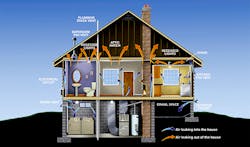In last April’s issue of Contracting Business.com, I stated that home performance belongs to the HVAC industry. Some from the traditional weatherization and home rating industry rebutted my statement, claiming they were in this “space” first.
If they define home performance as sealing and insulation, then they’re right. But that’s too limiting a definition and only addresses part of the equation. For the record, I never said home performance belongs to the HVAC industry “exclusively.” That would be arrogant and wrong. It’s part of what you, the HVAC service company, should do for customers.
By the way, why are so many companies still calling themselves “HVAC contractors?” As a service company, your primary role is taking care of your customers’ home comfort needs, which include safety, health, comfort and efficient energy use. So why call yourself a contractor?
A friend at the U.S. Department of Energy couldn’t understand why HVAC companies call themselves “contractors.” As a consumer he feels we’re doing ourselves a disservice by calling what we do contracting. How about referring to ourselves as the Home Comfort Industry, and the firms that deliver these services as Home Comfort Services companies?
Redefining Home Performance
Before you can truly integrate home performance into your business, you need to better define it with what you, as a home comfort services company, do every day. For starters, your business model is by far better than any traditional home performance company’s model. It’s sustainable because you have real customers, not just people who allow you to perform an energy audit to get a rebate.
Good home comfort services companies have long-term customers for whom they provide annual maintenance and safety inspections, perform repair work, and even replace their systems one or more times. The holy grail for most service businesses are maintenance agreements. The more you have, the more valuable your company, and the less susceptible you are to seasonal swings. Traditional home performance businesses don’t have this.
From a marketing perspective, we need to sell the results and benefits of what we do, not the fact that we are a home performance company, which means virtually nothing to a homeowner. They want the benefits, not the technical jargon.
From a technical perspective we must redefine home performance to include HVAC performance. Even BPI’s (Building Performance Institute) literature states that HVAC is the heart of home performance. I couldn’t agree more.
Your Role Redefined
As a home comfort company, it’s your job to learn everything you can about the building shell and envelope so you can connect the dots with the HVAC system (the heart and lungs of the home). It doesn’t mean you have to do everything, you just need to be the expert, and decide what work you should do, and what work you should sub or refer out. Essentially you become the “prime” service company.
You are truly in the driver’s seat on this one. But you have to open your eyes and see the whole picture, not just the traditional HVAC slice of it. This means training your employees to understand what your company is becoming. You must train each field employee both on the big picture of the services you provide, and drill down with training on their role in it.
The whole company, including customer service representatives and office staff, must understand your vision and the mission on how to get there. This won’t happen overnight. It takes a methodical plan with steps and stages through which you can take your people. This is definitely an elephant you have to eat one bit at a time.
To start, think of your company as providing “home performance as a service,” instead of one-shot home performance fixes for rebates. To a consumer this term may have little meaning. Talk about the benefits of what you do as a home comfort services specialist.
For example, a conversation could go like this:
“Mrs. Jones, your heating and air conditioning system is the heart and lungs of your home. In addition to servicing the equipment, my job is to look at the all the other mechanical parts of your home. This way I can make sure they are working in harmony to produce the safest, healthiest, most comfortable environment possible, with reducing your utility costs as low as I can.”
A follow up comment might be:
“Your home’s duct system and construction, which includes how it’s sealed and insulated, have a major role in maximizing all four of these key areas. That’s why we look beyond just the equipment when we come out to service or replace your comfort system.”
Get creative. There are many ways to say what you do, but the key is to keep it simple. Don’t use technical jargon. Always make it about customer benefits. In the months ahead we’ll dive deeper into how to integrate home performance into your home comfort services company.
Dominick Guarino is CEO of National Comfort Institute (NCI), a performance-based training,
certification, and membership organization, focused on helping contractors grow and become more profitable. His email is [email protected]. For more info on performance-based contracting, go to WhyPBC.com or call NCI at 800/633-7058.
About the Author
Dominick Guarino
Chief Executive Officer
Dominick Guarino is CEO of National Comfort Institute (NCI), (www.nationalcomfortinstitute.com), the nation’s premier Performance-Based training,
certification, and membership organization, focused on helping contractors grow and become more profitable. His email is [email protected]. For more info on performance-based contracting, go to WhyPBC.com or call NCI at 800/633-7058.

